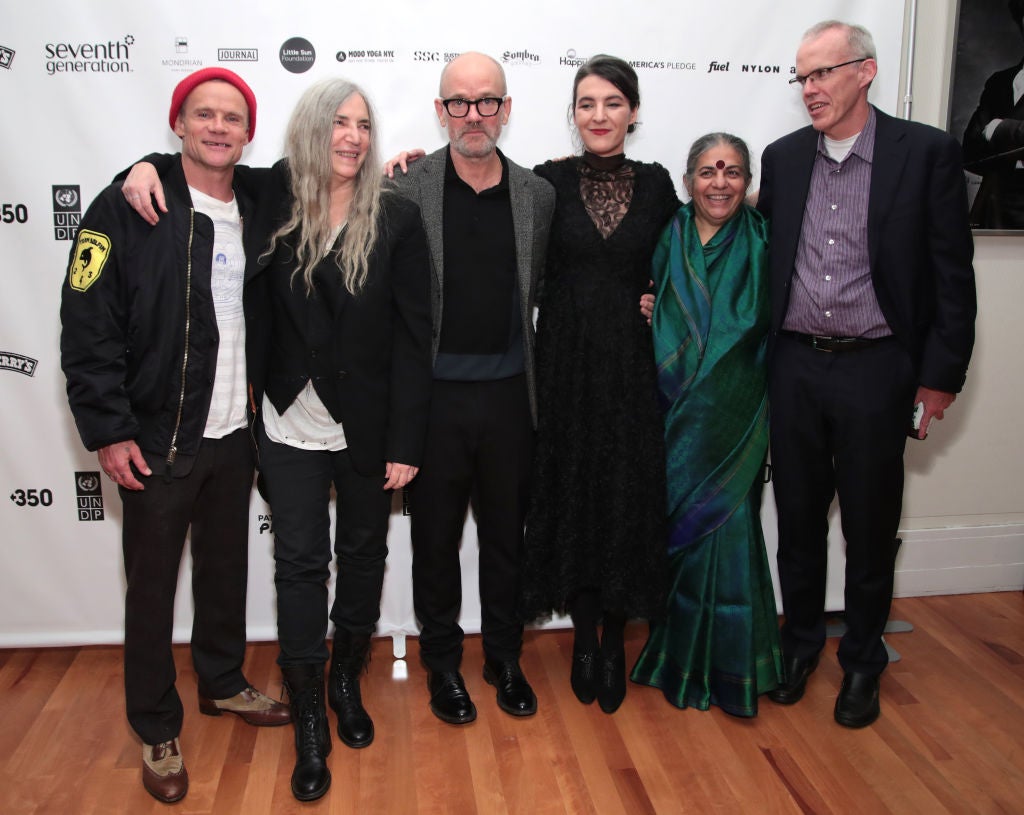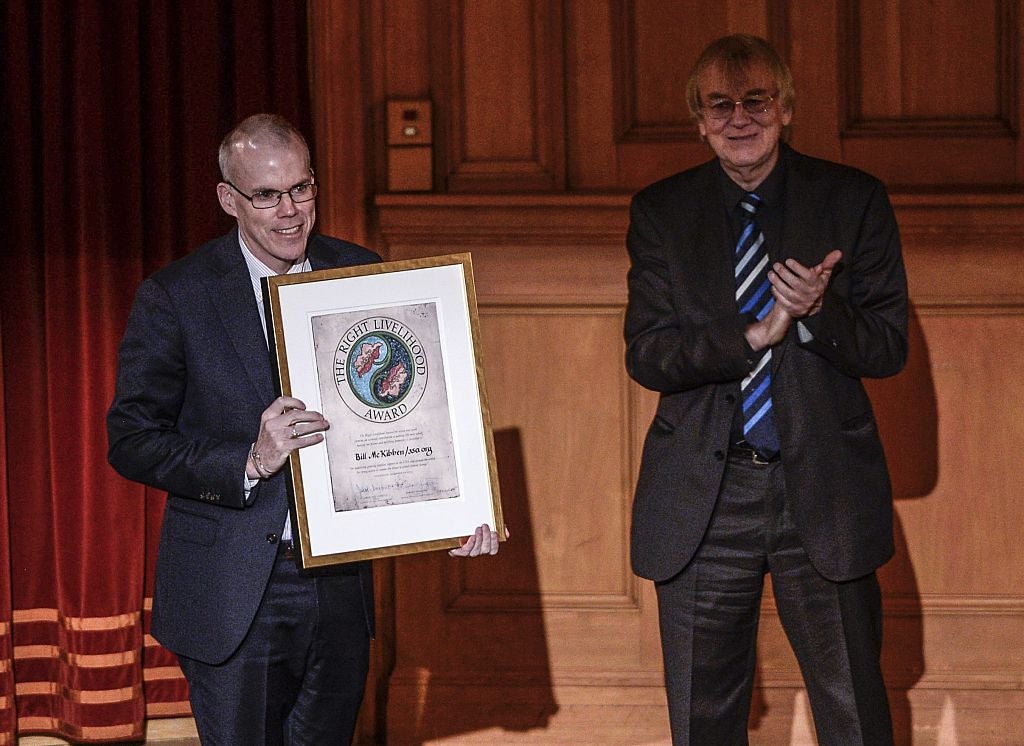His writing has been likened to a modern-day Henry David Thoreau or Ralph Waldo Emerson but Bill McKibben’s path to becoming one of the world’s leading environmental journalists, and the founder of not one – but two – climate movements, was far from guaranteed.
McKibben, 63, grew up in the Boston suburb of Lexington and attended Harvard, where he covered Ronald Reagan’s election for the school’s student newspaper, The Harvard Crimson. After graduating, he moved to New York, where his first job was writing “The Talk of the Town” section for The New Yorker.
“It was a very urban-centered existence, and truthfully, the issue that I was most interested in was homelessness,” McKibben told The Independent last month from his home in Vermont.
“I ran a homeless shelter in the basement of my church in the city, and I lived on the streets for a while to write about it forThe New Yorker. So if you’d asked me what I was likely to end up writing about and working on, I would have said those issues.”
But while reporting a magazine feature that traced all items in his apartment back to their natural resources, McKibben gained a new perspective on how each individual relies on the world at large.

“I traced the electric lines and ended up in Hudson Bay looking at the hydroelectric dam,” he said. “I was in Brazil looking at oil that they were buying from there. I was in the Grand Canyon looking at uranium and along the New York City water supply system, which is an amazing miracle.”
That story ended up shaping his future.
“For the first time in my life, I understood the world as a physical place. That’s a strange thing to say but I’d grown up in the American suburbs, which are kind of a machine for hiding the physical operation of the planet – where water comes from, how anything works.
“Now, I had this much stronger sense that even New York City, which seems like a place that can just mint money out of nowhere, was exquisitely dependent on this system of far-flung physical operations.”
Spurred by this revelation, McKibben, then about 24, began to investigate early findings on climate change. Around the same time, NASA scientist James Hansen testified before Congress about his research on the greenhouse effect and how the climate was changing.
“I was a journalist poking around, and I think because of that long piece I’d written, I had a much more visceral sense that this was going to turn out to be the most important story in the world,” McKibben said. “We were talking not about an interesting scientific curiosity, but about something that was going to turn everything about the world upside down.”

In 1989, McKibben published The End of Nature, widely recognized as the first book for a general audience about climate change. It remains in publication and has been translated into 24 languages.
He has gone on to write 20 more books, many about nature and the climate crisis, but also on Vermont history, mass media, and cross-country skiing.
But he is as well known for his environmental activism. In 2008, McKibben founded 350.org with a group of Middlebury College students, nurturing it into the first global grassroots climate movement, with chapters in more than 70 countries and 10,000 activists signing up each year.
The activist movement has been central to the ongoing global climate strikes, and last year nearly 700 events were held. Among its many achievements has been launching the fast-growing fossil fuel divestment movement, with endowments worth more than $40 trillion stepping back from oil, gas and coal.
Next, McKibben turned his attention to his generation of “Boomers”, who hold most of America’s financial wealth and vote in larger numbers than other age groups. He founded Third Act in 2021, which focuses on safeguarding both the climate and democracy.

This summer, these older activists have been out in force – their so-called “Rocking Chair Rebellion” – protesting at Wall Street’s biggest banks to demand that they cancel their investments in fossil fuels. During the largest event in July, some 60 members of Third Act were arrested at Citibank Plaza in New York.
“Washington and Wall Street have to listen when we speak, because we vote and because we have a large, maybe an overlarge, share of the country’s assets. And many of us have kids and grandkids and great-grandkids. We have, in other words, very real reasons to worry and to work,” McKibben said.
“Americans over the age of 60 are all busily writing, lobbying, getting arrested. That’s the outline of this saga. Doesn’t sound like much but it seems to have kept me busy.”
This commitment to the climate cause has won him myriad awards, including the Right Livelihood Prize, known as the “alternative Nobel” and the Gandhi Prize. He also holds honorary degrees from 18 colleges and universities. And his influence in the political sphere is so significant that during the 2016 election, his name was floated as a potential cabinet member for then-presidential candidate, and fellow Vermonter, Bernie Sanders.
McKibben brushes off the suggestion that he might have had a seat at the table in 1600 Pennsylvania Avenue.

“I think I’ve been able to have much more influence from the outside,” he said. “There are people who are good on the inside, and compromising with people is not one of my huge strengths. I think I’ve figured out the things that I’m good at, and I’ll stick with them.”
He added: “The other part is I got into all of this, on some level, because I love the outdoors, and I spend as much of every day as I can stealing away from other things, [to go] hiking, cross-country skiing or riding the bike.
“The thought of just having to disappear inside a building at nine o’clock every morning…”
Regardless, he has continued to be a force in bringing out the climate vote and is crisscrossing the country this election season to drive support for Democrat presidential candidate, Kamala Harris.
But this level of recognition and national involvement has had serious downsides. McKibben’s public prominence brings a steady drumbeat of death threats and in 2016, a months-long harassment campaign from a Republican opposition research group who followed him from home to grocery store to church, photographing and documenting any minor infraction deemed to be hypocrisy (like using a plastic bag or driving a gas-powered car).
Such an ordeal might leave one disenchanted and afraid, but McKibben remains stoically optimistic that the climate movement can make a real difference, particularly if we stick together.
“I do not try to fool myself, we’re not going to solve this thing one Tesla at a time,” he said. “The most important thing an individual can do is be less of an individual and join together with others, in movements large enough to change the economic and political ground rules here.
“I think if there’s one message I try to impart that’s it – don’t try to do this alone. It’s too big. And I’ve spent my life in one way, looking for other people to join in, beginning with writers and moving on to the world at large.”
The Independent will be revealing its full Climate100 List next week, and hosting an event in New York, which can be attended online. To reserve your place click here

